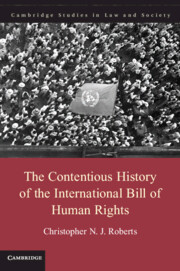Book contents
- Frontmatter
- Contents
- Preface
- Acknowledgments
- Introduction
- Chapter 1 What Are Human Rights and Where Do They Come from?
- Chapter 2 From War and Politics to Human Rights: The Cold War and Colonial Recession
- Chapter 3 Protecting State Sovereignty from the “Dangers” of Human Rights
- Chapter 4 Saving Empire: The Attempt to Create (Non)-Universal Human Rights
- Chapter 5 A Human Rights Treaty that Permits Lynching?
- Chapter 6 The United States’ Unequivocal Ambivalence toward Socioeconomic Rights
- Epilogue
- Index
- References
Chapter 6 - The United States’ Unequivocal Ambivalence toward Socioeconomic Rights
Published online by Cambridge University Press: 05 November 2014
- Frontmatter
- Contents
- Preface
- Acknowledgments
- Introduction
- Chapter 1 What Are Human Rights and Where Do They Come from?
- Chapter 2 From War and Politics to Human Rights: The Cold War and Colonial Recession
- Chapter 3 Protecting State Sovereignty from the “Dangers” of Human Rights
- Chapter 4 Saving Empire: The Attempt to Create (Non)-Universal Human Rights
- Chapter 5 A Human Rights Treaty that Permits Lynching?
- Chapter 6 The United States’ Unequivocal Ambivalence toward Socioeconomic Rights
- Epilogue
- Index
- References
Summary
Introduction
The supposed distinction between the category of civil and political rights, on the one hand, and socioeconomic rights on the other, is well established. The former category is often associated with the rights of free speech, religion, property, nondiscrimination, and the right to vote, for instance. The latter category is often associated with the idea of positive rights such as the rights to social security, education, employment, and adequate healthcare and standard of living. As opposed to government noninterference, positive rights require proactive measures or the institution of specialized programs. It is also not uncommon to distinguish chronologically the so-called “first generation” civil and political rights from the supposedly newer “second generation” socioeconomic rights. The two international Covenants we have today – one on Civil and Political Rights and the other on Economic, Social, and Cultural Rights – would seem to confirm the inherent difference between these two categories of rights. But beneath the widespread consensus about there being a distinction between these two groups of rights, there is significant disagreement about the relative importance and priority of the categories.
These contemporary questions are not new. This chapter examines a rights struggle that occurred in the late 1940s and early 1950s when the prospect of incorporating socioeconomic rights into the binding international human rights Covenant aroused strong opposition among interest groups, powerful legislative blocs, and professional organizations – most notably the American Medical Association. Because an enforceable human rights treaty that contained such rights was sure to be rejected by the Senate, during the drafting of the Covenant the US State Department opposed the inclusion of socioeconomic rights. On the international stage, however, the United States’ dismissal of socioeconomic rights put it at a significant geopolitical disadvantage – many of the smaller and non-Western states that were potential Cold War allies for the United States were among the strongest supporters of these rights. To manage these competing forces, the United States developed a strategy to appear accommodating of socioeconomic rights in the international setting while simultaneously excluding them from domestic soil. The outcomes of the struggles have left lasting ideas, enduring political institutions, and robust legal structures in their place.
- Type
- Chapter
- Information
- Publisher: Cambridge University PressPrint publication year: 2014



